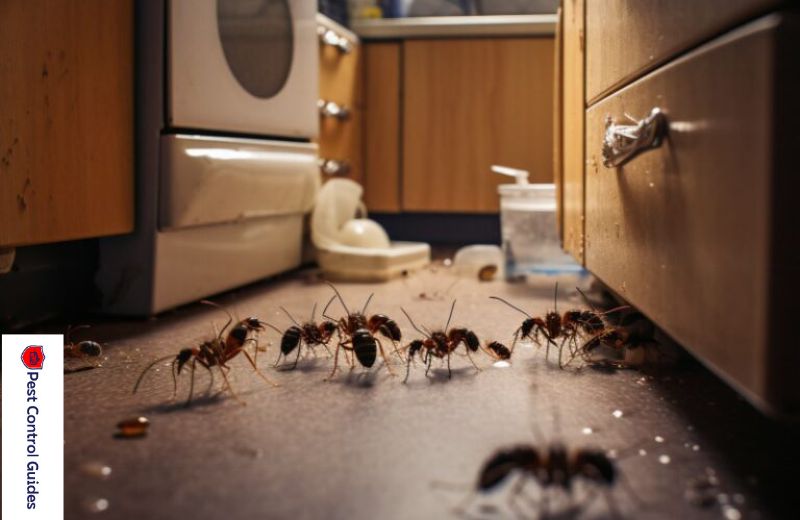Tiny ants in the kitchen are a frustrating but common issue for many households. These little intruders march along countertops and find even the smallest crumbs. It’s important to address tiny ants in kitchen as soon as possible. If left unchecked, a few ants can quickly turn into a full-blown infestation, contaminating food and making cleanup a daily battle. This post will provide practical tips and tricks to get rid of these tiny ants for good.
Steps to Eliminate Tiny Ants in the Kitchen

1. Eliminate Food Sources
The first step to solving any ant problem is to eliminate their food supply. Without food, ants have no reason to stick around.
- Clean Spills and Crumbs Immediately
Wipe down your kitchen surfaces and clean up any food spills or sugary residues. Ants are especially attracted to sweet and sticky messes.
- Store Food in Airtight Containers
Keep all food items sealed in airtight containers. This includes pantry staples like sugar, cereal, and pet food. Don’t forget to wash pet bowls after meals to remove leftover crumbs.
- Sweep and Mop Floors Regularly
Tiny pieces of food can fall into hard-to-reach places, like under appliances. Sweep and mop your kitchen floor regularly to remove any lingering snacks for ants.
2. Use Natural Repellents
Many people prefer to use natural remedies instead of harsh chemicals. These natural repellents are effective and safe for homes with kids and pets.
- Vinegar
Mix equal parts white vinegar and water in a spray bottle. Spray it on ant trails and entry points. The strong smell disrupts the ants’ scent communication and deters them.
- Lemon Juice
Lemon juice works similarly to vinegar by masking the ants’ scent trails. Squeeze fresh lemon juice near windows, doors, and other entry points.
- Essential Oils
Ants hate strong smells like peppermint, tea tree, and eucalyptus. Dilute a few drops of essential oil in water and spray it around your kitchen.
- Cinnamon
Sprinkle ground cinnamon near ant entry points or use cinnamon sticks. The strong aroma keeps ants away and makes your kitchen smell great.
- Coffee Grounds
Used coffee grounds are another natural option. Spread them in areas where you’ve seen ants, such as near sinks, windowsills, or pet feeding zones.
- Diatomaceous Earth
Sprinkle food-grade diatomaceous earth along ant trails. It dehydrates and kills ants while being safe for humans and pets.
3. Employ Ant Baits
Using ant baits is a great way to target the colony and not just individual ants.
- Borax and Sugar Solution
Mix equal parts borax and sugar with a little water to create a syrup. Dip cotton balls into the mixture and place them near ant trails. The sugar attracts the ants, and the borax destroys the colony.
- Baking Soda and Sugar Mix
Combine baking soda and powdered sugar and leave it in small dishes around your kitchen. Similar to borax, this method helps eliminate the entire colony.
- Commercial Ant Bait Stations
You can also use ready-to-use bait stations from stores. Place these traps near entry points or along ant trails. These stations work as the ants take poison back to their nest, eradicating the colony.
4. Seal Entry Points
Preventing ants from entering your kitchen is another effective strategy.
- Seal Cracks and Gaps
Use caulk or putty to close off any gaps around windows, doors, or pipes. Even the tiniest cracks can become entry points for ants.
- Fix Torn Screens
Check window and door screens for holes or tears and fix them immediately.
- Install Weather Stripping
Place weather stripping around doors to keep ants and other pests out.
5. Seek Professional Help
If your ant problem persists despite your best efforts, it might be time to call in the experts. A professional pest control service can identify the root cause and provide targeted treatments to completely eliminate the infestation.
Read Our Most Recently Published Guides on Termites, Earwigs, Fruit Flies, Ants Control, Baby Termites, Carpenter Ants and Gnats:
- How to Get Rid of Bed Bugs Permanently at Home Naturally in 2025
- How Much Does it Cost to Get Rid of Bed Bugs? 2025 Pricing Guide
- Tiny Baby Termites? Everything You Need to Know in 2025
- What Do Baby Termites Look Like? Termite Identification and Treatment in 2025
- Fungus Gnats vs Fruit Flies: How to Tell the Difference in 2025
- Do Fruit Flies Bite: How to Identify and Get Rid of Them at House
- Are Earwigs Dangerous or Poisonous to Humans and Dogs?
- Why Are There Earwigs in My House? Prevention and Treatment Guide
Final Thoughts
Getting rid of tiny ants in kitchen may seem like a daunting task, but with the right approach, you can take control of the problem. Start by eliminating food sources, using natural repellents, and sealing entry points. For persistent infestations, use ant baits or consult professionals. Addressing the issue early and consistently will keep your kitchen ant-free for good. Follow Us on Facebook, Pinterest and Twitter for the latest updates.
FAQs
What scent will keep ants away?
Ants dislike strong scents like vinegar, peppermint, tea tree oil, cinnamon, and lemon. Spraying or sprinkling these around entry points can help deter ants.
What is the best homemade ant killer?
A mixture of borax and sugar is one of the most effective homemade ant killers. It eliminates ants by attracting them with sugar, while the borax kills them and their colony.
How do I get rid of ants permanently?
To get rid of ants permanently, seal all entry points, keep your kitchen clean, eliminate food and water sources, and use ant baits to destroy the colony. Consistent prevention methods will also help keep ants from returning.
Is it bad if ants are in your house?
Yes, ants can contaminate food and spread bacteria. Some species, like fire ants, can bite, while carpenter ants can damage wooden structures. It’s best to address any ant problem quickly.



